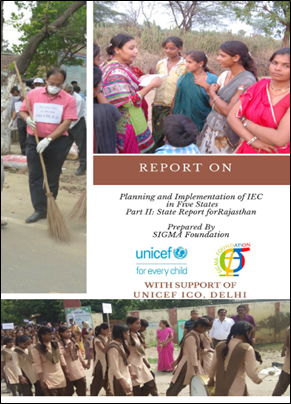Report on Planning and Implementation of IEC/SBCC Activities in Rajasthan
Contributed By: Dr. M.N. Roy, Dr. Debasri Mukherjee, Ganesh Choudhary, Dr. Baishali Bal, Sohini Tarafdar, Priyanka DuttaMDWS requested UNICEF India Country Office (ICO) to study the status of preparation and implementation of IEC/SBCC plans of different states for the year 2018-19. UNICEF ICO agreed to support such assessment in Rajasthan. UNICEF ICO partnered with SIGMA Foundation, a ‘Not for Profit’ organization to take up the study.
The approach adopted for the study involved analysis of the state and district IEC/SBCC plans for the year 2018-19 to review the plans and to assess various aspects of the processes of planning followed and implementation through field studies. Information was collected from different key officials through IDIs and various sections of the community through FGDs. 2 districts (Bhilwara and Sirohi) were selected in consultation with the state governments and UNICEF state office keeping in mind the diversity within the state. Sirohi Block in Sirohi district and Mandal Block in Bhilwara district were selected to assess the ground level IEC activities.
The report was shared with UNICEF ICO. It was found that the State plan had distinctive strategies for effective implementation of ODF-S and ODF Plus, IEC/SBCC strategies for realizing the goals for ODF-S and ODF-Plus included institutional strengthening, manpower engagement, strengthening capacity building, SBCC and strengthening related community processes. Capacity Building initiatives were to be taken in respect of: i) Toilet technology & retrofitting ii) Training of Panchayat functionaries. The state had also planned to organize various capacity building workshops. The state aimed to create a State Level Task Force of trained state resource group members so that proper implementation of ODF-S and ODF Plus activities could be rolled out as per AIP 2018-19. Costed capacity building interventions were planned for ODF-S at State/ district/ block level for various stakeholders/officials. 3,300 people were planned to be trained in the year 2018-19. An IEC Impact Assessment (IIA) was planned by the state for proper monitoring and evaluation. The state had identified some indicators for impact assessment and tools to be used as a mechanism for monitoring.

